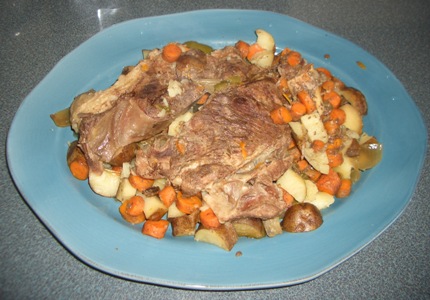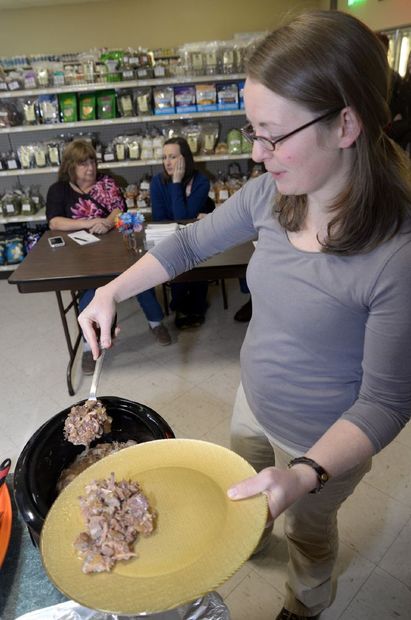|
|

|
|

|
|

|
|
We recently put together an event at one of our Longview retail locations: Jack’s Natural Foods. We did a presentation on Pastured Meats and Your Health, and took the time to share Matt’s health story and some of the things we learned about food during his battle with ulcerative colitis. We shared about the Weston A. Price Foundation and Dr. Price’s findings on principles of traditional diets. We finished by demonstrating how to render lard and offered samples of simple favorite recipes like pork shoulder roast and roast chicken.

We had lots of fun telling our story and talking about how important well-raised meats and eggs because of their high nutrient content and digestibility. Consuming whole animal foods (organs, fat, bones, AND muscle meats) is key for reducing inflammation and restoring the body’s God-given ability to heal itself. It is interesting to note that there are few, if any, auto-immune diseases that are actually curable, not just suppressible, by modern medicine. Matt was one of the many victims of the effects of a toxic, low-nutrient diet which is so prevalent in our society. It has always been close to our hearts to share what we’ve learned so that others can work to be restored to good health as we were.
Perhaps you have never heard his story of recovery from ulcerative colitis. He went from a tall, muscular, athletic young man to a frighteningly thin, anemic, debilitated sufferer of intestinal disease. There was no explanation. According to doctors, diet had nothing to do with the disease and the prognosis was hopeless without drugs and surgery. After his second flare-up, which followed a year of his strict obedience to doctors’ orders, we became convinced that we had to take our health into our own hands. It took several years to get his guts back on track, but we are happy to report that it has been almost 5 years since his last severe flare-up and 4 years since he took any prescription drugs. So what did he do to recover? Those were some of the topics discussed at Jack’s earlier this month. And of course, a big part of his recovery was changing to a Traditional Diet.
A few of the Traditional Diets principles we discussed were consuming generous amounts of pasture-raised animal fats, like butter, egg yolks and lard. Animal fat, when it comes from well-raised animals, contains lots of otherwise lost nutrients like vitamins A, D, and K. These nutrients are fat soluble and only found in their animal forms in the fat of animals. And it just so happens that these nutrients were plentiful in the most treasured foods of traditional (aka unmodernized) people groups. Nutrients like vitamin D and K are only found in the fats of animals eating green grasses and living outdoors in the sunshine.
Other principles of Traditional Diets are the intentional incorporation of bone broth and the use of unrefined salt. We talked briefly about fermented foods, raw milk, and avoiding vegetable oils.
We discussed preparing simple foods and meals, like roast chicken and pot roast in a crockpot. Real food doesn’t need to be complicated. One of my most effective strategies for implementing real food is not elaborate planning or strict routines, but rather a simple idea: keep basic supplies on hand at all times, like potatoes, onions, ground beef, lard, and broth. Even when you’re feeling uninspired to cook, you can still put something together that is real, nourishing, and delicious.
It seems there is a need in the East Texas area to learn about what is truly healthy based on evidence because there is so much misinformation out there and so many laboratory-based products that make claims upon your health. We’ve always felt that a proprietary “food” that can’t be made or grown at home but only purchased from a particular company cannot be a sustainable way to achieve and maintain health. Yes, sure, we’re selling a product, too, but we aren’t hiding how we do it or where we got our information. You could do it, too, if you wanted to! The truth is, though, that most folks don’t mind leaving the farming to us. 🙂
There also seems to be a lack of knowledge for implementation strategies. How do you incorporate these principles? Where do you get the foods? How do you cook them? Lard is among the most bewildering foods to incorporate, not because it’s hard, but simply because contemporary food wisdom eschews the use of fat almost entirely, and, well, pork fat? Won’t that kill me dead after the first bite?
We might argue otherwise. We’ve been eating it for years! And though eating pasture-raised pork fat in the form of lard is only a small part of our overall eating strategy, we often focus on that because it has the ability to displace some very nasty conventional dietary components, including trans fat and vegetable oils. Not only that, but fat has the ability to satiate the appetite. Try eating a plate of cracklin for dinner. I would guess you’d only get through the first bite or two before your body says, “Enough. I’m full.” It’s very difficult to overeat when you’re eating the good kinds of fats.
So take this as an encouragement to start taking baby steps toward a more traditional diet. Check out the Weston A. Price Foundation and their extensive (free!) database of dietary wisdom. Would you like us to come do an event like this in your area? Let us know and we’ll see if we can fit it in between feeding pigs, moving cows, and taking care of our trio of future Cadman farmers. Happy eating!
PS—Glenn Evans at Longview News Journal was kind enough to come and cover our event. Check it out here!